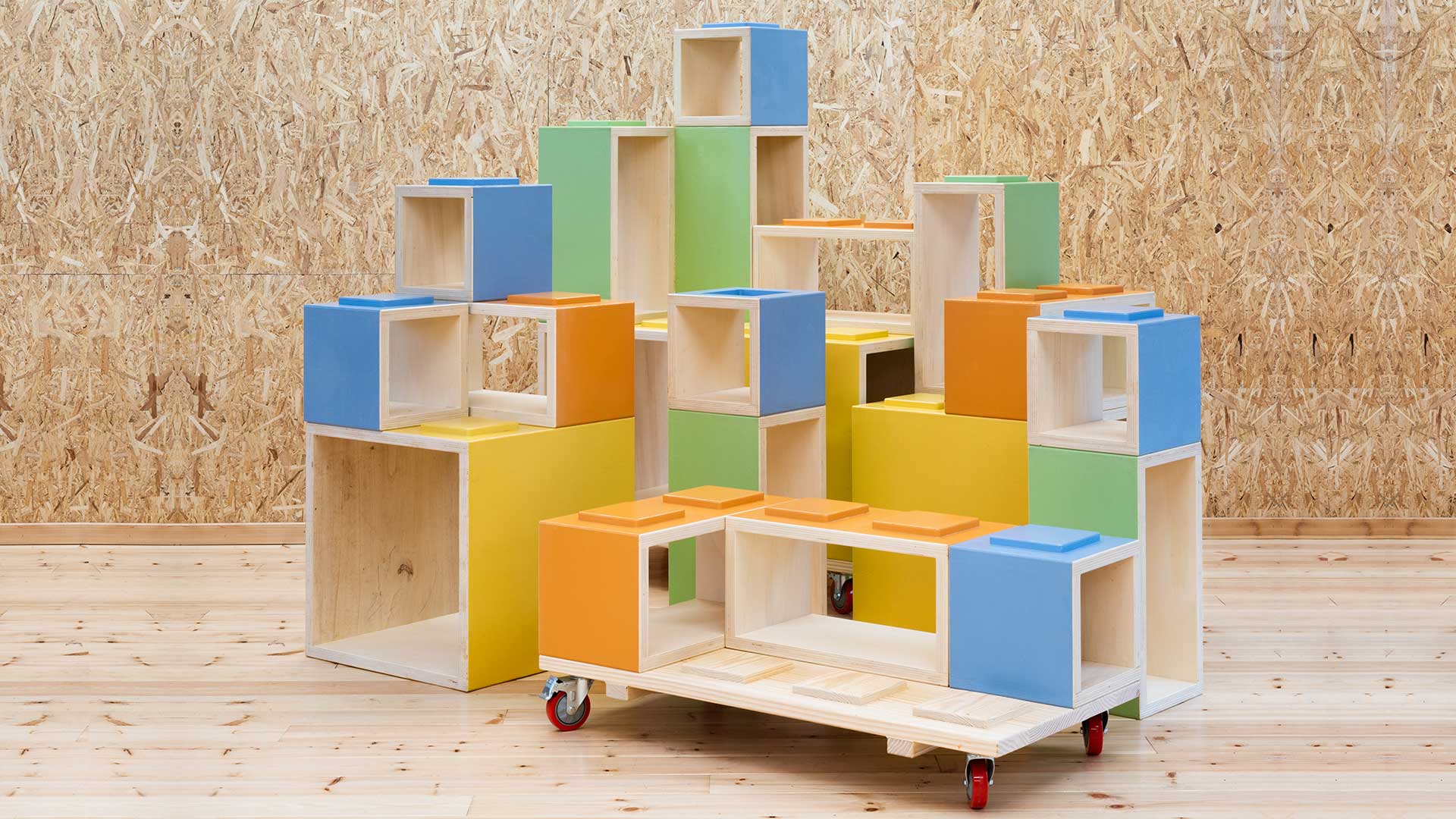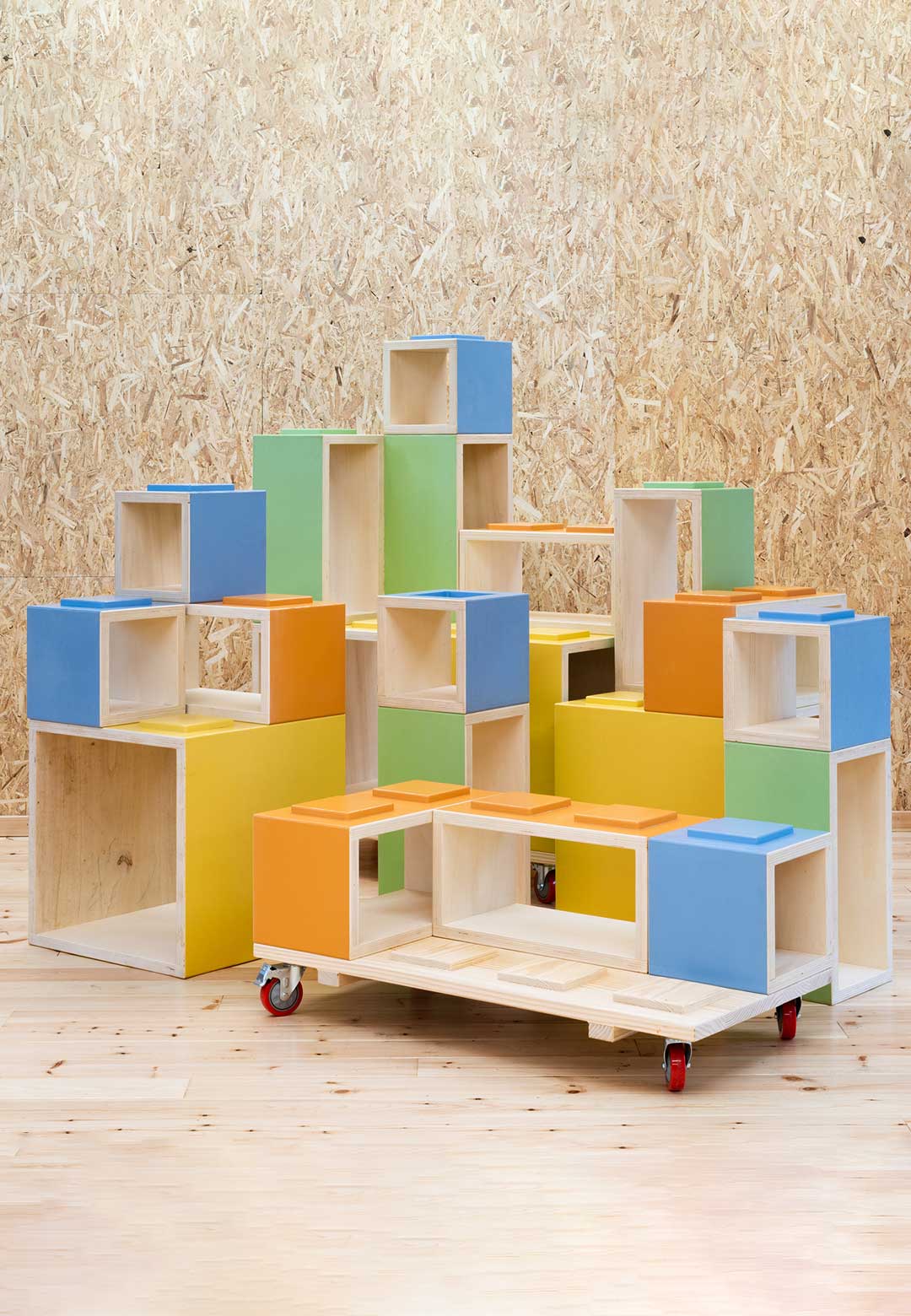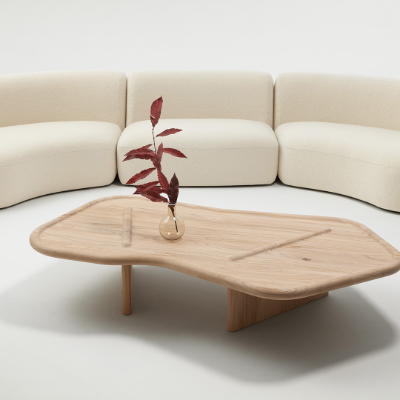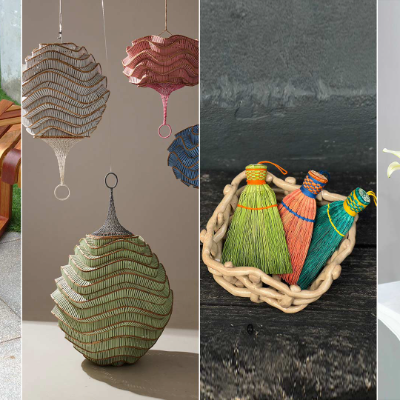In the world of early childhood education, the role of furniture goes beyond being a mere accessory; it transforms into a crucial component in shaping an environment that fosters the holistic development of young minds. At the forefront of this innovative approach is QUOIN, an interactive and multi-functional kindergarten furniture series meticulously crafted by the Brazilian designer, Miguel Saboya. Commissioned by Lisbon-based school Cooperativa Aa Torre to furnish a new prefab classroom, QUOIN transcends traditional furniture design, offering a dynamic platform for play and learning. Comprising of modular -design building blocks and a plywood trolley, this series invites children to actively participate in the creation of their individual educational spaces.
Interactive furniture serves as a cornerstone in the holistic development of children. Beyond its utilitarian function, furniture designed with interactivity in mind stimulates cognitive, emotional, and social growth. This series, crafted by the product designer, takes a giant leap in addressing this need by inviting children to engage in assembling and disassembling their surroundings. This hands-on approach not only enhances fine motor skills but also encourages problem-solving, fostering a sense of ownership and collaboration. Through QUOIN’s Lego-inspired interlocking system, children are not merely seated at a table; they actively participate in constructing their learning environments giving them autonomy from an early age.
The QUOIN series, with its five modular furniture pieces, a slat, and a trolley, offers a versatile approach to kindergarten design. The configuration possibilities are as diverse as the imaginations of the children interacting with them. These boxes seamlessly combine to create varied stool designs, table designs, and storage solutions, meeting the multifaceted needs of a vibrant classroom. The inclusion of slats allows for the creation of larger shared desks, promoting communal activities like group meals and collaborative projects. The trolleys are designed for easy mobility, empowering educators and children to effortlessly transform the layout of the classroom, adapting to the evolving needs of the learning environment.
In the day-to-day life of a kindergarten classroom, each configuration within the series finds its purpose. Comprising of 60 pieces in six different shapes and different boxes that seamlessly combine to form traditional classroom structures such as benches, stools, tables, and shelves. However, QUOIN’s versatility extends beyond these conventional applications. The series was designed for children to explore a world of imaginative possibilities, from play and hiding spaces to stairs, bridges, and adventure trails. It is within these varied configurations that the true ingenuity of the series emerges, it adapts to the evolving needs of both educators and children, creating an environment where creativity knows no bounds.
As we delve into the significance of QUOIN, it becomes evident that Saboya’s creation is more than just furniture; it is a catalyst for a more engaging and dynamic educational experience. The Lego-inspired interlocking system, rooted in the personal ideology of the furniture designer, reconnects children to the physical world, offering a counterbalance to the prevalent screen-dominated culture. In a society where the digital realm often takes precedence, the series reignites the joys of hands-on experimentation, where the act of building becomes a learning pathway.
Sharing his views on the series, the product designer says, “QUOIN allows children to imagine a new kindergarten every day for a more playful learning experience”. This encapsulates the essence of the collection; an invitation to reimagine, recreate, and actively participate in shaping one’s environment. Saboya’s commitment to involving children in the creation and design of their built environment is not only a testament to his design philosophy but also a celebration of the boundless creativity inherent in every child.
As a small design studio, Saboya’s approach to the series was deeply personal and collaborative. Rodrigo Motta, the director of Cooperativa A Torre, initially reached out to the designer, drawn to the playful nature of his designs. What followed were several in-person meetings where Saboya delved into the needs of the teachers and observed the children, paving the way for an inspiring and participative brainstorming process. From these interactions, the designer translated ideas into simple and scalable designs, keeping in mind the practical requirements of the classroom. The entire process, from initial meetings to the delivery of the QUOIN series, spanned four months. The success of the project has since led to inquiries from other schools interested in developing their own configurations.
Based in Lisbon, Miguel Saboya is a designer who employs traditional Brazilian design woodworking techniques and joinery to craft contemporary furniture pieces. Introduced to woodworking at Portugal’s Ricardo Espirito Santo Foundation, he incorporates the rich tradition of craftsmanship from both Portugal and his native Brazil into his work. In 2018, Saboya founded his eponymous atelier in Lisbon, where he handcrafts each piece, emphasising the timeless quality of wood that can be passed down through generations.
Saboya’s design philosophy draws inspiration from everyday objects, reinterpreting familiar forms in noble materials. With a keen interest in the physical and material world, he strives to reconnect children with the joy of experimenting with their hands and building things. His product designs underline the importance of engaging with the tangible world in the digital age, creating pieces that are not only functional but also encourage creativity and exploration.
Child development, especially in the early years, is a complex interplay of factors, and the environment plays a pivotal role. Furniture designed with interactivity in mind becomes a facilitator in this journey, offering a tangible platform for growth. As children actively engage with their surroundings, whether through assembling QUOIN’s modular blocks or participating in collaborative activities facilitated by its versatile configurations, they are not merely interacting with furniture; they are shaping cognitive, emotional, and social abilities. The tactile and Interactive experience provided by the furniture stimulates sensory perception, laying a foundation for enhanced fine motor skills. Moreover, the collaborative nature of activities around the series brings in a sense of belonging and teamwork, essential skills that extend far beyond the kindergarten classroom.
QUOIN stands as a testament to the transformative power of interactive furniture in early childhood education. It is more than a collection of modular building blocks; it embodies a philosophy that places children at the centre of their learning experience. As we navigate this landscape where furniture becomes a conduit for growth, we are prompted to reflect: In our pursuit of creating inspiring educational environments, how can we ensure that each piece of furniture serves a practical purpose in enhancing children’s learning experiences and fosters a genuine interest in the learning process?






 Sign in with email
Sign in with email








What do you think?